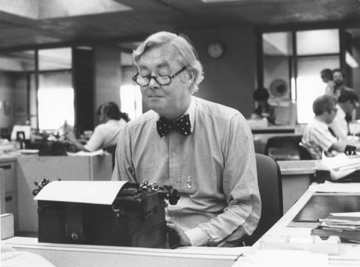You’ll be hearing from the AAPSS staff again in the very near future because, on September 1, we’ll be calling for nominations for the 2021 Moynihan Prize, an award that is meant, at least in large measure, to honor people who show us the good that can be done when public action is suffuse with scientific understanding. Given that the Prize and its objectives have been top-of-mind for us recently, I’ve been thinking a lot about a closely related question: What’s the best way for social science to present itself to policy elites and to the public? Particularly: How should we think about the ways in which others regard the social scientific community when public anxieties are elevated by COVID, BLM, the general election, and any number of daily politicized dramas that are seemingly designed to pique our cognitive dissonance and provoke doubt in public service?
I don’t pretend to have a simple answer to the question, mostly because there’s a paucity of evidence to guide my opinion. First, it’s well documented that the public has a durably high trust of science (e.g., see Pew for Americans’ views, or Gallup’s global monitor for a world view), but very little is known of whether that trust extends to social science, or even whether the general public associates knowledge of human behavior with the scientific method. There’s a clearly intuitive path, for example, from “bench science” on disease to doctors’ ability to cure, but a much less clear path from social science discovery to public welfare (read Prewitt for the opinion of this Academy’s President on how the social sciences should be working on self-improvement).
Second, there’s the question of how the public presentation of science—and specifically, social science—needs to be calibrated in clearly fraught times. There’s a great deal of accumulated evidence on effective leadership in crises, but little about how institutions (and the individuals within those institutions) can be most effective when their role is to act in support of public and political leadership. Much is made these days about “living in a post-truth world,” but I’m not at all sure that we’re in such a world; perhaps the trouble lies with us—the messengers of evidence and truth—and not with the existence of truth or the appetite for it among public servants or public constituents.
Part of the brilliance of Sen. Moynihan was the extent to which he was able to embody the scientific  understanding that so many of us would like to see more of in the public square today: valuing facts and evidence while understanding their limitations in debate; illuminating the importance of scientific methods without having to rely on science jargon; providing evidence from social research in a persuasive, political register; and exhibiting the joy that can come from endless curiosity and learned skepticism. These are qualities that are difficult to measure, hard to come by, and easy to forsake in moments of passionate debate.
understanding that so many of us would like to see more of in the public square today: valuing facts and evidence while understanding their limitations in debate; illuminating the importance of scientific methods without having to rely on science jargon; providing evidence from social research in a persuasive, political register; and exhibiting the joy that can come from endless curiosity and learned skepticism. These are qualities that are difficult to measure, hard to come by, and easy to forsake in moments of passionate debate.
So I hope to hear from each of you on who you think would be a fitting recipient of the next Moynihan Prize, and that your letters of nomination will outline the ways in which your nominee fits the extraordinarily peculiar moment in which we find ourselves. The people we choose to recognize in such times matter to our own self-image but, more importantly, they might even carry our values to the institutions that serve our nation and the world.

